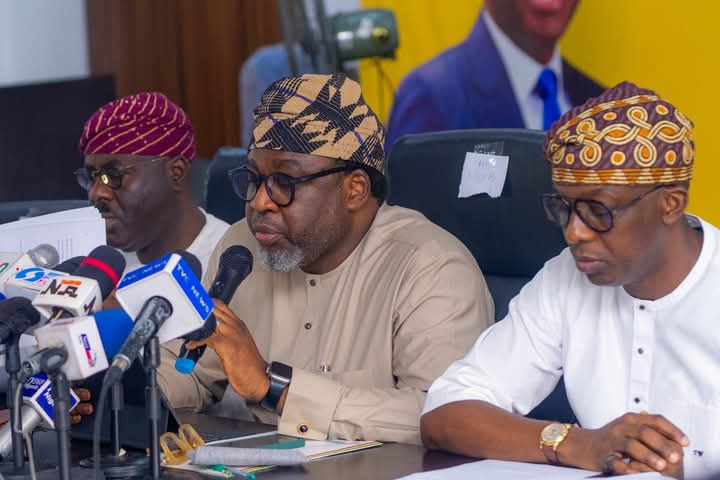Lagos State has allocated N1.052 trillion for infrastructural development in its 2025 budget, reaffirming Governor Babajide Sanwo-Olu’s commitment to completing ongoing projects across the state.
The Lagos State Commissioner for Economic Planning and Budget, Ope George, disclosed this yesterday during the ministry’s Budget Analysis press conference in Alausa, Ikeja.
He was joined by several commissioners, special advisers, and government officials who provided insights into the budget breakdown and implementation strategy.
The 2025 budget, tagged the “Budget of Sustainability,” has a total size of N3.367 trillion and will be funded through a projected revenue of N2.968 trillion.
This includes N2.230 trillion from Internally Generated Revenue (IGR), N111.839 billion from capital receipts, and N626.137 billion from federal transfers.
READ ALSO: Medical doctor bags seven years in prison for N127m fraud
George stated that the Lagos State Internal Revenue Service (LIRS) is expected to generate 63% (N1.4 trillion) of the IGR, while other ministries, departments, and agencies (MDAs) will contribute the remaining 37% (N830.177 billion).
To achieve budget sustainability, he said Lagos will deepen revenue sources, expand the tax net, and leverage technology, economic intelligence, and data analysis to enhance tax collection efficiency.
He also reassured residents that the state has adopted a self-financing approach that minimizes debt.
“We have carefully chosen a financing strategy that ensures the budget’s full implementation without leading to excessive borrowing,” he stated, urging Lagosians to support the government by paying taxes promptly.
The Commissioner highlighted key projects spanning the state’s five divisions, emphasizing that N1.052 trillion, representing 31.27% of the total budget, has been earmarked for infrastructure.
Some of the major projects include the construction of Samuel Ekundayo/Toga Road in Badagry, Abaranje Road in Alimosho, and Adamo-Akanun-Agunfoye Lugbusi Roads in Ikorodu.
Others include the rehabilitation of roads in Ikeja GRA, including Oba Dosunmu Road, Sasegbon Street, and Sobo Arobiodu Street, as well as the upgrade of the Lekki-Epe Expressway (Phase IIA – 18.6km).
READ ALSO: Lagos 2027: Obasa, Seyi Tinubu, Ambode, Jandor, others eye Sanwo-Olu’s seat
The government will also construct the Opebi Link Bridge to Maryland to improve travel time, rehabilitate and expand the Eti-Osa Lekki-Epe Expressway (Phase II), and construct the Lekki-Epe Airport Road and Omu Creek Road.
The urban renewal and technical studies for the 4th Mainland Bridge will also commence.
The government has also earmarked funds for the construction of the Lagos-Badagry Expressway, the dualization of Ojo Road and Baale Adeyemi in Ojo, and the development of the 68km Green Line Rail from Marina to Lekki Free Trade Zone.
The Lagos Rail Mass Transit System (LRMT) Phase II, which will extend from Mile 2 to Okokomaiko, will also receive attention.
To improve water transportation, the state will complete 13 new jetties and upgrade existing ones.
The budget also prioritizes the completion of Abule Egba and Ajah Bus Terminals under the Bus Reform Initiative (BRI), the construction of the Iyana-Ipaja Bus Terminal, and the expansion of key transport networks.
Additionally, the government will focus on housing development, with projects spread across Ikorodu, Badagry, Ikeja, Lagos Island, and Epe.
READ ALSO: Prioritise education funding, Obasanjo tells Tinubu
The state plans to complete 444 housing units in Sangotedo (Phase II), 420 units in Ajara-Badagry, and 136 units in Ibeshe II and Epe. Other housing projects include Egan Phase II and III.
Environmental protection is also a key focus, with N287.241 billion, representing 8.5% of the budget, allocated to environmental projects.
These include the construction of drainage infrastructure across Lagos, preliminary work on six critical natural drainage systems at Alaba International Market, Kosofe, and Ikorodu, and the implementation of waste-to-energy projects.
The state will also continue partnering with the private sector to enhance waste management and transform public spaces into serene and secure recreational areas through LASPARK.
The government has also prioritized youth and sports development, with plans to complete stadia in Ikorodu, Badagry, Epe, Ifako-Ijaiye, Ketu, Ibeju-Lekki, Sari Iganmu, and Ajeromi.
The construction of a permanent NYSC camp in Epe is also included in the budget.
Commissioner for Finance, Abayomi Oluyomi, assured residents that Lagos remains financially stable, with 80% of the budget funding sourced internally and only 10% from borrowing.
He noted that the government is also exploring creative financing options to sustain development without overburdening the state with debt.

